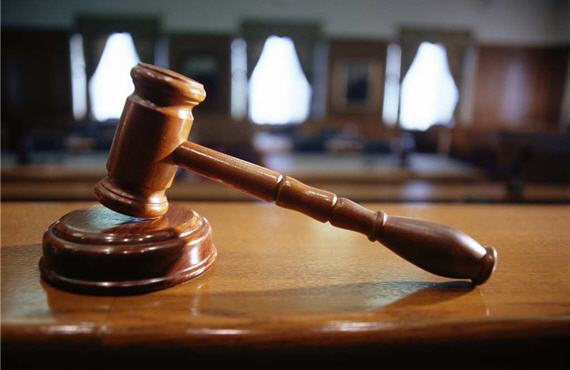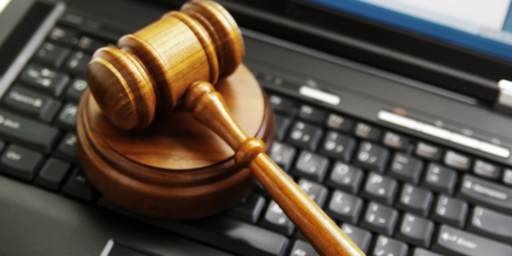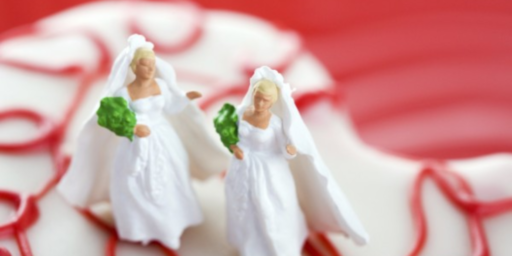Calling Someone ‘Gay’ Not Necessarily Slander, Some Courts Are Saying
As societal attitudes change, what counts as an insult so bad you can sue someone over it also changes.
The New York Times reports that decisions are starting to be handed down at the trial court level ruling that calling a person ‘gay’ is not, in and of itself, enough of a slur to create a cause of action for slander:
ALBANY, N.Y. (AP) — One by one, courts around the country are deciding it’s no longer slander to falsely call someone gay — a measure of how attitudes are changing in the era of same-sex marriage and gays in uniform.
While “gay” is still widely wielded as an insult, some judges have concluded that it is not damaging to anyone’s reputation, just as calling a white man black is no longer grounds for legal action as it was a generation ago.
The latest ruling came from a midlevel New York state appeals court Thursday and was hailed by gay-rights activists as a small but meaningful victory.
The case involved a woman who was sued for allegedly spreading a rumor that an upstate New York man was gay in the hope of breaking up his relationship with another woman. In a 4-0 decision, the New York Appellate Division’s Third Department threw out the lawsuit before it went to trial, noting changing attitudes about homosexuality.
Reversing decades of legal precedents, the court said the defamation claim was “based on a false premise that it is shameful and disgraceful to be described as lesbian, gay or bisexual.”
“This word has been sort of de-fanged in some ways,” said Curtis Houlihan, a consultant from New York City who is gay. “I suppose some would say this is empowering … but that is not going to change the level of bigotry and discrimination in this country.
“But we’ll take every little victory,” Houlihan said Friday. “We can move slowly because the country is still filled with men living in the ’50s.”
Legal experts and gay rights activists say judges in other parts of the country have made similar rulings over the past several years, but tracking them is difficult because there are relatively few slander or defamation lawsuits brought and laws vary from state to state.
In 1994, for example, North Carolina’s Court of Appeals said a person can sue over being called a homosexual only if he or she can prove actual damages. The court said the law cannot automatically assume such remarks inflict damage.
“The courts are all over the place on whether it is defamatory to refer to a person as gay,” said W. Wat Hopkins, a professor in Virginia Tech’s communications department. “In some jurisdictions, a court would hold that such a reference is defamatory, and in others courts would rule as you say the judge did in New York.”
He said judges would probably consider public opinion within their jurisdiction and other factors, such as whether the state has legalized gay marriage, something New York did last year.
In the past, being called gay could cost people their jobs. For decades, homosexuality was considered akin to having a loathsome disease or being a criminal, especially since sodomy was a crime in most places.
A decade ago, actor Tom Cruise successfully sued for millions of dollars in the U.S. and Britain over false claims he was gay, arguing that the story threatened his career playing straight leading men.
Jonathan Turley, a law professor at George Washington University, comments:
I have long believed that courts should reexamine the common law approach to the homosexuality slur. In the past, such a slur was viewed as clearly defamatory when homosexuality was not just viewed as immoral but was a crime. For example, In Neiman-Marcus v. Lait, 13 FRD 311 (SDNY 1952), employees of that high-end story sued the author of a book titled “U.S.A. Confidential.” The book claimed that some of the models at the store and all of the saleswomen in the Dallas store were “call girls.” It further stated that most of the salesmen in the men’s department were “faggots.” The issue came down to the size of the group. With 382 saleswomen and models, the court found that the group was too large. However, with the 25 salesmen, the court found that an action could be maintained.
However, the question is whether this view would change with circumstances. For example, such an allegation against a religious person or religious figure or politician opposed to homosexuality might present a different question. Yet, the question is whether it should be a per se category. The same question of changing social values is raised by calling a woman “a slut” and whether that is just common trash talk or a defamatory statement.
While laws vary from state to state, slander is generally defined as “an untruthful oral (spoken) statement about a person that harms the person’s reputation or standing in the community.” This suggests, as both the article and Turley note, that whether or not ‘gay’ (or any other derogatory word commonly used to refer to gays or lesbians) is slanderous depends largely upon the type community in which the act takes places, which could mean the state the parties live in or even just the local, professional, or social community to whom the allegedly slanderous statement was broadcast. Calling someone ‘gay’ in New York City is, arguably, different from calling them ‘gay’ in a small town in South Carolina, whether it is truthful or not. Additionally, as Turley suggests, making such an untrue statement about someone who is prominently religious would arguably create a legal claim even though it would not if the same untrue statement were made by a member of the general community. For example, Tom Cruise could argue that his earning potential as an actor would be harmed by false allegations of homosexuality, even though there is basically no stigma against being gay in the Hollywood community that he is a member of.
This does raise an interesting hypothetical question, though. Are there any conceivable circumstances where falsely calling a gay person ‘straight’ would be considered grounds for slander under the law? And what about the world “slut”? It’s an interesting point to ponder.
It’s also worth remembering that there used to be a time when alleging that someone was part African-American was considered actionable slander. This was especially true in the South, where even having one black ancestor was enough to have once considered black by general society. Those laws went by the wayside gradually as racial integration and the Civil Rights Movement began to change public opinion on racial issues. To some extent that’s exactly what’s happening with the word ‘gay.’ Public acceptance of homosexuality, and homosexual relationships, is becoming near universal, a dramatic change from where things were even twenty-five years ago. Because of that, calling someone ‘gay’ doesn’t necessarily count as something that would harm a person’s reputation or standing in the community. That’s a sign of progress for the gay community, and society in general, and one less reason that people can drag each other into Court.







I don’t think it should be generally defamatory, but given the specific circumstances I think it might be here. By analogy, incorrectly identifying someone as married would not generally be defamation, but if you start telling people someone is married with the specific intent of getting their girlfriend or boyfriend to think they’re lying about the relationship, that probably would be actionable.
“Pubic acceptance”???
Yea okay, that was an unfortunate typo
@Doug Mataconis: As my smartphone-wielding friends always say: “Darned autocorrect!”.
I am old enough to remember when “gay” meant happy!!!!!!
@Ron Beasley: It still does according to Merriam-Webster. In casual usage, at least among some younger people, its also come to mean “Lame,” as in That’s so gay.
@rodney dill: No, that’s so Takei.
@Mr. Prosser: Oh my!!
Despite the fact that some organizations and employers are adopting non-discriminatory policies against sexual orientation, Being outed as gay can still cost you a job, and many other things. They say “in the past”. I don’t know where they ever got the idea that discrimination against gay people is “in the past” It is definetely quite a present day occurence. I think it shows an unwillingness to acknowledge what gay people are STILL going through!